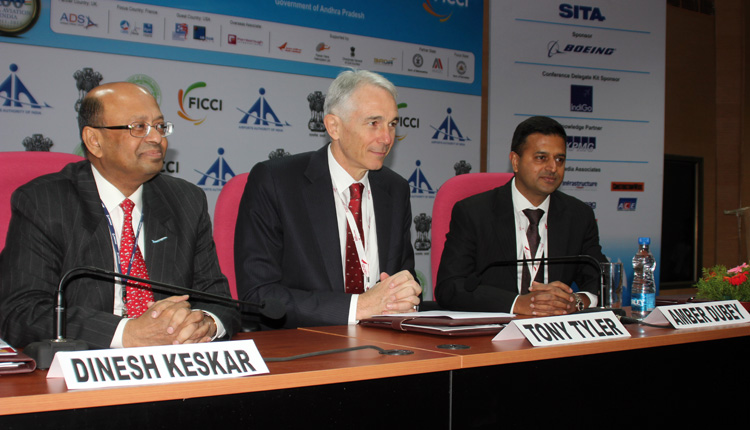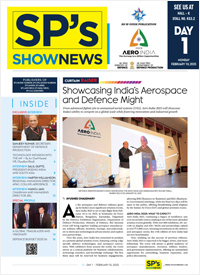- Prime Minister Narendra Modi inaugurates Aero India 2023 in Bengaluru; Releases Commemorative Stamp
- Defence Secretary meets delegations from Saudi Arabia, USA and Oman on the sidelines of Aero India 2023
- Foreign Ministers of 32 countries to attend Aero India 2023
- Embraer showcases the C-390 Millennium at Aero India 2023
IATA demands major government support to aviation sector

With the Indian aviation sector going through difficult times, Tony Tyler, the Director General and CEO of International Air Transport Association (IATA) today made a fervent appeal to the Indian government to rework its aviation policies as to keep the industry afloat.
Painting a gloomy scenario at the India Aviation 2012 summit in Hyderabad, Tyler said “if Delhi has to become a global aviation hub, it cannot happen with the present policies. It is one of the costliest airports in the world.”
“The state of today’s Indian aviation industry is the result of a number of factors - not least of which was an aggressive expansion by the country’s airlines that took effect just as the world encountered a pair of massive economic shocks in succession. By that of course, I am referring to the skyrocketing oil price in 2008 that shifted almost overnight into a global financial crisis.”
FOUR PILLARS. Tyler said an agenda to build competitiveness in Indian aviation rests on four pillars - taxes; infrastructure; costs and; investment policies.
“Let me start with taxes. Yesterday the Minister of Civil Aviation (Ajit Singh) mentioned the need to make air travel more accessible. One way of achieving that is by taxing it less. Our concern over the application of the 10.3 per cent Service Tax to air tickets as well as to services that airlines purchase, such as landing and air navigation fees, is well known. There is the legal argument that it contravenes the provisions of the Chicago Convention. While the Ministry of Civil Aviation is quite familiar with ICAO principles, the Ministry of Finance continues to ignore international obligation. Removing the burden of the Service Tax would improve the competitiveness of Indian aviation, boost access to both domestic and international connectivity and drive economic growth.”
FUEL TAX DESTROYING COMPETITIVENESS. Even more damaging however, is the tax on fuel. All fuel is subject to an 8.24 per cent excise duty. Then domestic flights face state level fuel taxes up to 30 per cent. The result is destroying the competitiveness of Indian airlines. Globally, fuel accounts for about 32 per cent of an airline’s cost base. For Indian carriers it is 45 per cent. MOCA has understood this and is lobbying to reduce the burden.”
“MOCA is seeking to address the issue of high jet fuel prices by allowing airlines to directly import fuel. So far the impact has been limited because we believe the Competition Commission of India and the Petroleum Ministry have not yet mandated access to off-airport transport and storage infrastructure.”
Tyler said, “The high cost of jet fuel has been hijacking the competitiveness of the Indian air transport industry for over a decade - with every flight that has taken off or landed on the sub-continent. We appreciate the effort to start to address the issue. It is now clearly recognized by all that fuel taxes are sucking the life blood from the Indian aviation sector. The industry is now in crisis and we need a coordinated effort among all Ministries - at national and state levels - to restore competitiveness.
“The mission for such a coordinated effort is clear. Taxes - particularly state taxes - should be removed and a National Access Regime must be established for jet fuel. Such a regime should allow users, including airlines, access to critical fuel infrastructure at reasonable prices.”
BUILDING INFRASTRUCTURE. Tyler remarked “When India wants to build world class infrastructure, it clearly can succeed. Why then is Navi Mumbai so long delayed? Its two runways and potential to handle up to 60 million passengers per year is badly needed to serve India’s economic capital. The first phase was meant to open in 2014 but construction has not yet begun. Land acquisition is not even complete.
“Even with recent expansion, the facilities at Mumbai are bursting at the seams. Navi Mumbai is not an option. It is critical. And the only way that I can see it being completed without further delay is if the government - all Ministries - coordinate their efforts to facilitate success - as they did for Delhi’s new terminal.
“Industry is a willing partner in developing critical infrastructure. In 2008, we successfully worked with the Airports Authority of India (AAI) to fund Data Link services in the Bay of Bengal with a $4 per flight fee over four years. The data link was successfully installed, and is improving airline operations. There is surplus in the account. Airlines want to use it in a Project India initiative that will develop strategies to reduce delays and improve the efficiency and robustness of air traffic management. Where we see value and a clear return on investment, airlines are willing partners in developing infrastructure capabilities.”
DELHI MOST EXPENSIVE AIRPORT. Talking about Delhi airport, Tyler mentioned that “Overall airport charges at Delhi, using market rates, are aligned with those in Seoul, Auckland or Madrid. But if you convert this to a purchasing power parity rate, the current rate is about 50 per cent or higher than charges at major hubs such as Heathrow, Paris or Tokyo. With that, cost-efficiency gains would be expected.
“Instead, Delhi International Airport Limited (DIAL) proposed a 740 per cent increase that would make it the world’s most expensive airport. The Airport Economic Regulatory Authority or AERA, knocked that back to 340 per cent to be implemented in two stages. If that materializes, Delhi will still become the world’s most expensive airport. India’s aviation industry is sick. Adding a $300 million headache to it will put it in intensive care from a cost perspective. And it also is estimated that a 5-7 per cent decrease in demand will result. Such an increase in charges would certainly fit the Ministry of Tourism’s “Incredible India” description, but it will come with a fall in tourist arrivals and further damage to local and international connectivity.
“Given the broad economic implications of such an increase, it is important that the government takes immediate action. First 340 per cent is unacceptable. It would be a shock to the system that would ripple throughout the economy.
The Ministry cannot stand by and let this happen. It must intervene with a broader context. This should take into consideration the long-term development of Indian aviation at its hubs. And if need be, the concession contracts, which at Delhi channel 46 per cent of revenues to AAI, need to be rethought with the aim of offsetting aeronautical charges.”
Tyler said there was need for “urgent review at the structure of charging for international versus domestic. We all use the same airport and runway. There is no justification for differential charges or charges based on distance flown. In fact, like the application of the Service Tax, it contravenes ICAO rules. Finally, there should also be a review of the allocation of aeronautical and non-aeronautical assets to be more in line with other major international airports.”
Excluding foreign airlines in FDI not good. The IATA DG and CEO said that the 49 per cent cap on foreign investment in airlines aligns with the general practice globally. But the complete exclusion of foreign airlines from investing in Indian carriers set by the Ministry of Commerce is unique to India. Given that foreign airlines could invest to own 100 per cent mass rapid transit systems, ports and harbors, hotel s and tourism, inland water and ocean transport, toll roads or tunnels in India.”
Tyler added the MOCA has proposed that the restriction be lifted so that foreign airlines could own up to 49 per cent of an Indian domestic carrier. “What is the public policy imperative of denying this possibility to Indian carriers? I hope that it will be given due and positive consideration by the Indian cabinet.” Allowing foreign airlines to invest in Indian aviation is not a panacea, unless the other three pillars - costs, taxes and infrastructure - are addressed.
“The problems facing the Indian aviation sector are severe and beyond the control of airlines. Solving them will require a government-wide team effort. MOCA can and has taken steps in the right direction, but without the support of the Ministries of Tourism, Finance, Environment and Petroleum and the Competition Commission, the major changes that are needed cannot take place. Many committees and groups of government officials have looked at remedies in the past. Another committee is not the answer.
I would suggest that a common vision - expressed in a National Aviation Policy strongly linked to an implementation plan - could be a way forward.”





